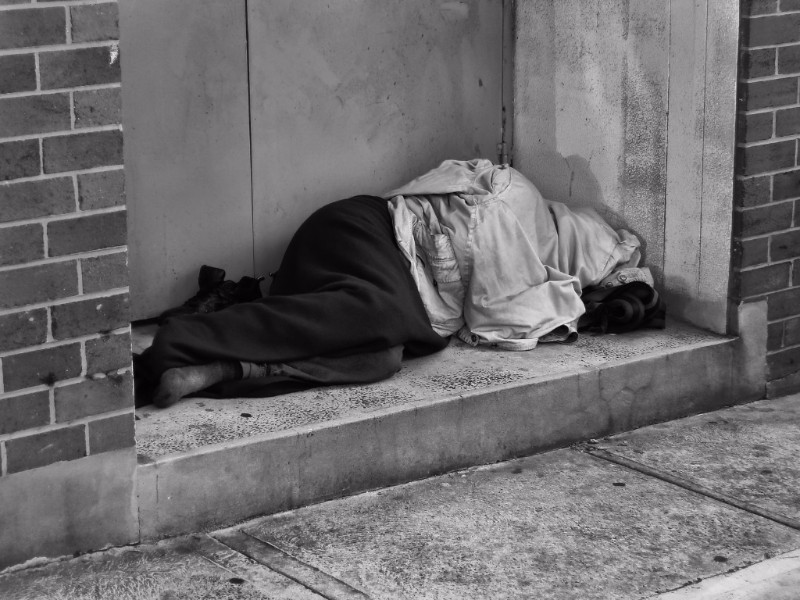No Trespassing! Unless anyone wants ice cream?
| . Posted in laws, News - 0 Comments
On June 23, 2016 the Massachusetts Supreme Judicial Court affirmed that a homeless person can be cleared of criminal trespass charges if they trespassed to save their life. That’s all well and good, but the case appears to have been about a Great Barrington, MA property owner who trespassed into an ice cream parlor in June, among other adventures.

The Berkshire Eagle posted to their Facebook page that David Magadini has chosen to live as a homeless person.
As reported by the Boston Globe, David Magadini of Great Barrington was arrested for criminal trespass on three properties in February, March, April and June 2014, seven charges total. Six of the convictions were vacated in the recent decision and sent for retrial.
The Globe does not explain what the SJC decision does, namely, that Magadini had had a no-trespass order filed against him for entering SoSo Creamery, an ice cream shop, in January, and that he re-entered the following June against court order, during business hours, simply to relieve himself. There was no emergency. The court upheld this conviction.
The Globe called MassLandlords asking for a comment on the case, giving less than four hours to research and reply. We declined, and good thing, because the case gets weirder.
Magadini May Have a Home and Money
The Globe’s tissue thin reporting fails to investigate what may be common knowledge in Great Barrington, that Magadini may be himself a homeowner.
According to MassLandRecords.com, one David Magadini is the deed holder of record for 78 Christian Hill Rd, Great Barrington, MA. (Online comments on the Boston Globe Article tipped us off to this possibility.)
MassLandlords could not verify whether this was the same David Magadini, but the circumstantial evidence is intriguing:
- The primary Google search or whitepages results for the name “David Magadini” indicate that it may be unique in Massachusetts.
- The Berkshire Edge wrote a story on “The Mayor of Main Street” and called his way of life “eccentric” but stopped short of saying he chooses to live on the street.
- On December 2, 2015, a different paper, the Berkshire Eagle posted on Facebook that Magadini “has opted to live on the streets”.
- The SJC filing notes that the lower courts judged Magadini has having failed to demonstrate inability to afford a hotel room.
MassLandlords asked a Great Barrington local to comment on the record, but they declined. Does Magadini have means or not?
The Boston Globe Did a Lousy Job with this Story
This story is being heralded as a landmark decision, but in fact, it is a narrow ruling affirming existing laws. And the “poster child” for homelessness may in fact be a wealthy but eccentric trespasser.
The Globe’s quoting practices are especially lamentable. MassLandlords wasn’t even able to comment in time, and consider what was said by Kelly Turley, homelessness advocate at the Mass Coalition for the Homeless.
Turley said, “As any one of us likely would do in similar circumstances, he [Magadini] found warm places to stay even though he was not welcome there in order to survive in a harsh New England winter.”
Amen to the sentiment! No human being would tell a homeless person to go die in the cold. But we doubt the Globe told Turley about, or gave her time to discover for herself, the June ice cream trespass, or Magadini’s alleged wealth, either of which might have shifted the direction of her quote.
The picture being painted is not homelessness per se but the decline of journalism, or to be more generous with the Globe, mental health at best: Great Barrington has a shelter. Magadini was denied entry. The SJC decision states, “He was told to leave because of ‘certain issues’.” Was he being disruptive to the other tenants? This could signal mental health troubles.
But were the “certain issues” an oblique reference to Magadini’s alleged choice to live outside of his home? The shelter staff might wish to house only those who actually need shelter. They may have known, as perhaps locals do, that Magadini may have had means.
There is a story here, but it is not the one reported.
No Impact on the Law
The justices, for their part, appear to have produced a technically correct decision, especially in demanding retrials.
They have affirmed the criminal conviction for the June trespass in the ice cream shop. They have affirmed established law. It’s bizarre that they have reversed the detailed investigations of the lower courts, who could have prevented criminal trespass convictions if the facts of the case had merited it. But the law requires certain procedural disclosures about the “defense of necessity,” and these were not made, so the case must be retried.
In any event, this is not the case the homelessness advocates were hoping for, nor the landlords, nor anyone, really, except the ACLU defense attorneys.
Questions Unanswered
Overall, this case highlights the extreme inadequacy of our current approach to homelessness, mental health, private property, and/or journalism. We honestly can’t tell which. As a Commonwealth, we spend hundreds of millions of dollars a year in tax revenue to help and shelter the homeless. Is the system a failure for this individual? Something seems to have gone wrong here. Why was he denied shelter? Why are we still tying up public resources retrying his trespasses? What is going on?
Advice for Landlords: The Fear of Squatting and Trespass is Real
Massachusetts has some of the toughest housing laws in the country. One Warren landlord we spoke with, Ron Bernard, had squatters in his vacancy all winter.
Bernard said, “There was little that the police could do about it, other than keep an eye on the place to ensure peace was maintained.”
Bernard’s tenants were eventually enticed to leave. He said, “They’re still on the hook at housing court for rent and damages, but that’s purely academic.” Bernard was referring to the inability to collect on court judgments in Massachusetts.
Landlords interested in keeping control over their property, whether residential or commercial, should use the recent SJC case as motivation to conduct a security audit of all the properties. Do fences and gates restrict common areas? Are doors, hatches, and windows lockable from the inside? Are tenants and staff properly trained in the use of these locks? Does the building need electronic surveillance or a security system? Are there obvious unsecured means of entry? Landlords should walk around each building to see.
Conclusion
Until our society can help every last individual with their particular, idiosyncratic needs, we will continue to have disagreement over property and space.
Try to avoid having your business become the proverbial “Great Barrington ice cream shop.” You won’t know why they’re there, you won’t be able to prosecute them, but you can be glad when the misreported stories shrink back into the margins and, like so many of the genuinely homeless, just seem to disappear.




